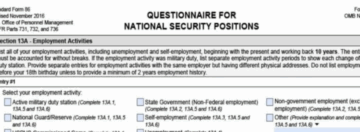Are Foreign-Born U.S. Citizens a Threat to National Security?
Everyday immigrants from all over the world legally enter the United States to live and work as permanent resident aliens. Eventually, after meeting residency requirements, they apply for and are granted U.S. citizenship. This now opens the door to becoming eligible for a security clearance and many who work on contracts or directly for the government undergo a background investigation, are cleared, and then granted access to classified/sensitive information or facilities. There is no problem here, right? They are, after all, now U.S. citizens.
The Egyptian-Born Electrician and the Security Clearance
Highlighting a loophole that has long been exploited by foreign intelligence operatives, a story posted by the Virginian Pilot Online website describes how an Egyptian born electrical engineer, Mostafa Awwad, was granted a security clearance and given access to the Gerald A. Ford, a new $13 billion U.S. Navy aircraft carrier. The story goes on to say that the FBI had been monitoring Awwad, and finally decided to arrest him on December 5th for attempting to sell the design plans. During his meetings with an FBI agent posing as Egyptian Intelligence Officer, Awwad was cited as ridiculing the U.S. government for giving people like him a clearance. The U.S. cleared community includes naturalized citizens from Russia, China, India, Pakistan, Iraq, and even Iran just to name a few.
As far as anyone knows, no one tracks how many foreign-born U.S. citizens have security clearances, but one can be sure that the total number is quite significant. Another issue is those who hold dual citizenship, and the fact that the only way to really know if someone retains citizenship with another country is through self-disclosure. Are these issues a threat to national security? Should the current background investigation process be changed somehow to add extra vetting for these naturalized U.S. citizens? Keep in mind that the majority of them are true blue loyal patriots who would defend the U.S. just as vigorously. if not more, than their American born neighbor. How would you avoid ostracizing these loyal Americans while at the same time trying to ferret out the isolated few who would try to do damage to the United States? Therein lies the challenge, and with politics and budgetary constraints to consider, there really is no easy answer.



Comment Archive
I have a couple questions re: responding to the SOR. I feel I have three choices: a) not respond and let it run it’s course, which will lead to a denial in my clearance and being let go of my job or b) respond and appeal by providing supporting documentation of destruction of my non-US passport and renouncing my non-US citizenship from the the Embassy. (I have not yet taken the steps required for option B)
I am beginning to wonder about option c) quitting this job. It is not a job I thoroughly love or need right now. I am moving in less than 90 days to another country (husband is active duty) and my supervisor already has been given a heads-up on this timeline. If I put in my notice for this job, will the clearance be an automatically denied?
Regardless of what happens, what are the long-term repercussions of having a denial in my ‘professional baggage’? Will I be barred from ever working for the gov’t in the future? Or only for positions that require security clearances?
Thank you!
Regarding having a denial in your professional baggage, it all depends on whether you plan on working for the U.S. Government or as a contractor in the future (within 5 years)and whether it would need a clearance. If you do see a need for a clearance in the future then I would advise trying to mitigate the issues. For positions not requiring a clearance there would be little or no impact as foreign preference/influence are not factors in the adjudication process, but a new investigation may be required if the current one is not favorably adjudicated. If you quit before the final decision is made then it would be a loss of jurisdiction by the adjudicating agency, and does not indicate anything negative.
While your article makes some interesting points, foreign born US citizens are no more of a threat than native born Americans. Just consider those who have betrayed their own country during the last couple of decades. I am proud to say that I am a foreign born American and I would do anything to defend the principles for which it stands. I have carried clearances and served on missions abroad as a civilian. Betrayal is a personal characteristic -a matter of values or a lack thereof- and not a matter of where you were born or what ethnic group you belong to.